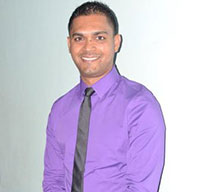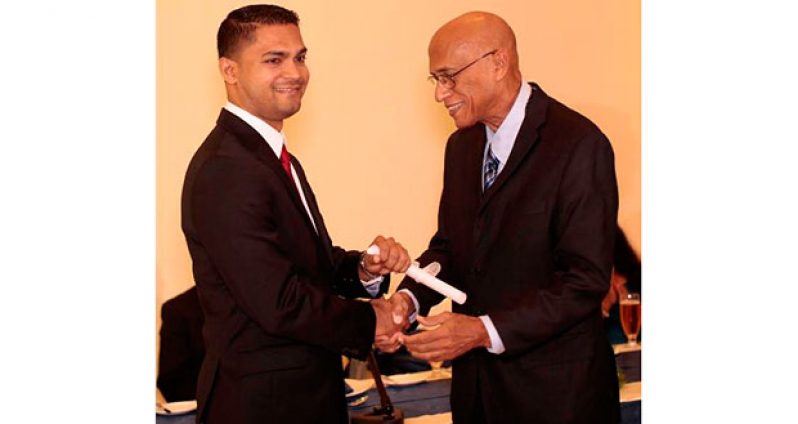A GINA Feature
First ‘time’ and first ‘person’ are always of note, and it is appropriate, even though redundant, to say that ‘first time’ means history. This is really the scenario with Dr. Amarnauth Dukhi, Guyana’s first neurosurgeon. He is young, brilliant, well trained and aptly qualified to live up to his well garnered credentials and his unwavering desire to boost Guyana’s

medicare.
Dr. Dukhi is Guyana’s first neurosurgeon and is proud of the fact. “It’s something that I have always wanted to do,” he told the Government Information Agency, in an exclusive interview. Dr. Dukhi will be stationed at the Georgetown Public Hospital Corporation (GPHC), from January 2015.
Guyana’s situation is one that it evolving; its incipient groundwork augurs well too, as “Because of the patients’ needs (distance of abode and unique medical condition), the neurological department at the GPHC will be ever ready to receive the patients, after stabilising is first effected. So the hope is that something will be worked out, to facilitate ‘ease’ and ‘speed’ of movement, from that point of encountering the ailment to the GPHC,” he said

The youthful and ‘rearing to go doctor’ opined that this kind of ‘rapid response’ culture must now be a priority for the regional health system, so that the entire process becomes even more effective, that is, from learning about a situation, stabilising a far-off patient (no matter where), and then actually having that patient at the best place possible-the department at the GPHC.
The journey-becoming a specialist
Dr. Dukhi’s journey began in Skeldon, Corriverton, where he was born. Attending the Skeldon Line Path Secondary School, he wrote the Caribbean Examinations Council exams in 1995 and was adjudged the third best graduating student. He then immediately entered the University of Guyana, and soon after completed a Bachelor’s of Science degree in Biology and Bio Chemistry in 1999. After this, he worked for a short while, before he got his scholarship through the Government of Guyana’s “Cuban Scholarship Programme.”
This he gladly took up, and thus acquired a Bachelor’s of Medicine in 2006; being quite a prodigy, he copped the Best Graduating Student. He then returned to Guyana, fulfilling necessary contract commitments in serving fellow Guyanese and the Government for three years. His major stints were at the GPHC and the New Amsterdam Hospital.
What should be known too is that Dr. Dukhi is really multifarious. He was actually quite set in the surgical field of orthopaedics and most would have comfortably remained there. However, he was not sated scholastically nor professionally, and so felt the need to expand and diversify. The end result of this burning passion in him is that Guyana’s own Dr. Dukhi, grabbing the proffered ‘field of neurosurgery’ made it his own; he is now bonafide neurosurgeon, a sub-facet in the health sector that constantly suffers from a noticeable paucity of specialists.
Further zeal
“In that area (Orthopaedics), I was already in the surgical field…now having a surgical background already, and this being something that I always love doing, (I thought to myself that when I went back to study (with the fresh opportunity I got), I knew that I had to do neurosurgery, because we were in a severe shortage, and then our country was always looking for ways to send our people overseas to get these done.”
I asked myself (at the time) “…why can’t a Guyanese become a neurosurgeon?” “It was a big sacrifice of five years of residency, but then I decided that I had the opportunity and there was no way that I would leave it. So I picked it up and here I am five years later.”
Before completing the neurosurgical programme, Dr. Dukhi actually further fortified himself in the medical arena; he completed a ‘double master’s programme, specialising in comprehensive general and family medicine. The neurosurgical programme was then conducted by Havana’s principal neurosurgeons.
Tracing his academic history, Dr. Dukhi recalled that when he first received the opportunity to specialise in this (second) field, it was natural for him to take it. This, he said was primarily because there was no such expert here locally. He also was moved by the fact that it was too costly to send patients overseas for treatment, and this was extra-arduous for even some of the rich folks.
Today, he states that he is not only proud of himself, but also ‘feels good’ that he is able to help fellow Guyanese, of every ilk, to alleviate the ‘pain in the nervous system’ at any given time.
Training for this scholar was within the principal neurosurgery programme, conducted at the University of Havana, at the Calixto Garcia Medical University Hospital in Cuba. This began in early January 2010. “It was a great experience. That was the centre of neuro trauma, and it was also the principal programme, where the Cuban government trains neuro surgeons for the world at large-the country, South America, Latin America and the entire world,” Dr. Dukhi stated.
He adde:, “It was a great advantage to study at the Galixto Garcia Medical University Hospital, knowing the history and all the good doctors and specialists coming out of there. That was an opportunity I used over the last five years, to become who I am today, and it is something that I plan to use in the near future, so that I can serve Guyana and its people.”
Importance of choosing neurosurgery
Dr. Dukhi pointed out that “… most of the scholarships offered through the Jagdeo/Castro initiative in 2001, were for undergraduate studies in human medicine, along with undergraduate specialties -agronomy, engineering and so on…. and in medicine, we had quite a few scholarships, but they were all undergraduates, not speciality ones. So when I went back in 2009/2010, I was the only person going back then to specialise. That was given to me prior to coming back to Guyana … I was also the top medical student graduate in the year 2006 in my medical school, so I was offered that, but I chose to come back and (first) serve in 2006.”
So it was after serving his time with Government, that he took up the scholarship (which was still open). Dr. Dukhi explained that the field of neurosurgery was chosen because of its necessity in Guyana at that time.
“One of the things we always wanted was someone in the neurosurgical field. We had to send our people overseas, we had people who were here at the hospital waiting for people to come in and see them, people who come once per month and so on,” Dr. Dukhi stated. He added that whilst acknowledging that it would be a very hectic programme, he willingly gave the five years needed to bring this specialty to Guyana-something worth it all.
“Neurosurgery is vital in the medical field, because of the importance of the time factor- it gives good results … so instead of waiting to go overseas, we have someone here, who could assist urgently …appropriately, and then we will add to good results in terms of medical/health care in our country.”
Dr. Dukhi explained that he was placed at the GPHC, as part of the public health care system, where health care is given to all Guyanese, free of cost. Guyanese learning that a neurosurgeon is now available will be secure in the knowledge that everyone will be able to benefit.
Health sector one foot higher
Dr. Dukhi’s accomplishment which moves Guyana forward in the Health Sector has evoked pride in Minister of Public Service, Dr. Jennifer Westford. “It was hard studying for a specialty and there are very few persons who can do it in the Caribbean formally.”
With Dr Dukhi’s achievement, the Ministry of Health now has a neurosurgeon thanks to the partial scholarship from the Government of Cuba. “Thanks to Dr. Dukhi, who studied conscientiously… we now have our own neurologist, so Guyanese patients can feel a little more comfortable when they suffer from these injuries.”
She added that there is the expectation that next year another person would be sent, along with another specialist to be trained in neurosurgery. Minister Westford pointed out ruefully that Dr. Dukhi cannot work continuously 24/7 even though he is a workaholic.
He will be heading the Neurosurgery Department and Guyanese patients will get the possible treatment. “We are one foot higher in the medical field and I am proud of our achievement,” Minister Westford proudly said


.jpg)











